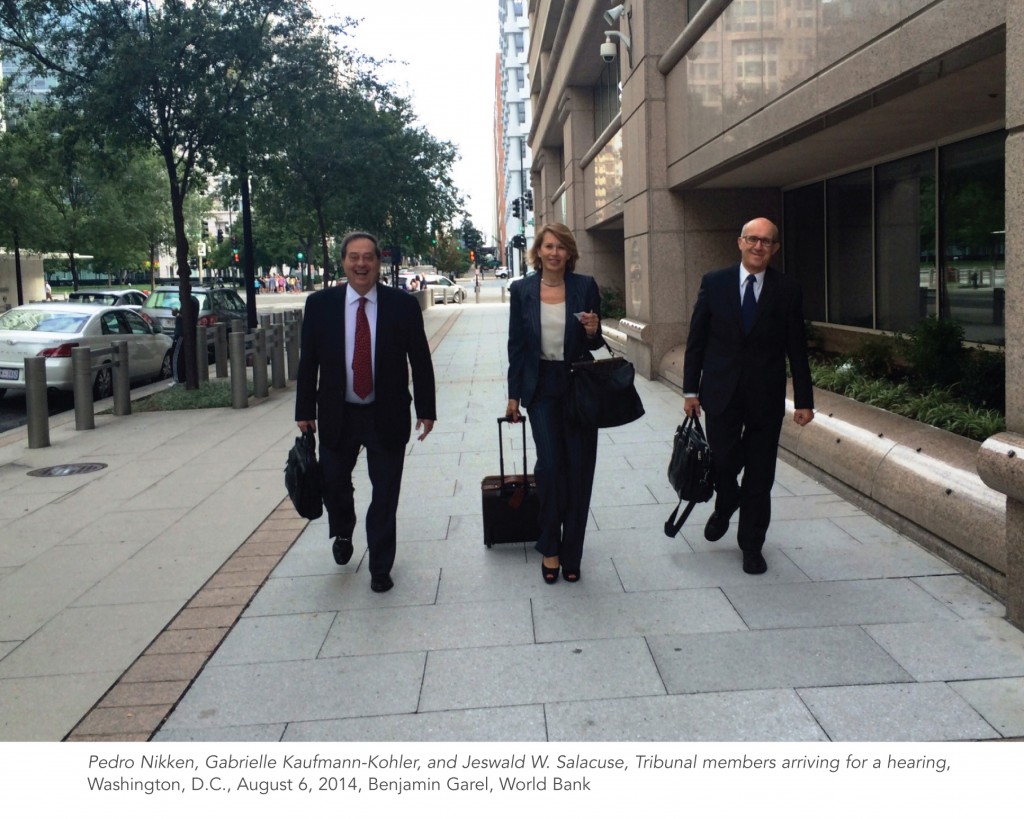Faculty Spotlight: Jeswald W. Salacuse
Professor Jeswald W. Salacuse, the subject of today’s Faculty Spotlight feature, has had a long and varied career at Fletcher, starting in 1986 with eight years as dean, and continuing as he transitioned to a teaching role. Currently, as the Henry J. Braker Professor of Law, Professor Salacuse teaches International Investment Law, Corporate Governance in International Business and Finance, Law and Development, and a new course Negotiating International Leadership, but in his post below, he tells us about one of his out-of-Fletcher activities.
I moonlight as an international judge. For the past several years, while teaching full time at the Fletcher School, I have served as president of an international arbitration tribunal, hearing cases brought against Argentina by foreign investors in that country. The investors have claimed that the Argentine government had not treated them as it had promised in various bilateral investment treaties made with the investors’ home governments. A principal purpose of investment treaties, of which there are now about 3000 in the world, is to protect and promote investment between the countries that sign them. Under these treaties, each country promises, among other things, that it will not expropriate investments from the other country and that it will treat them fairly, provide them with protection and security, and will not discriminate unjustly against them.
Promises are only as good as the mechanisms to enforce them. The enforcement mechanism in investment treaties is international arbitration, a process that allows investors to sue a foreign government before an independent international tribunal, to obtain compensation for injuries caused by that government’s failure to give the investor the treatment promised under the treaty. Granting a private party the right to bring an action against a sovereign state in an international tribunal is a revolutionary innovation that now seems largely taken for granted. Yet its uniqueness and power should not be overlooked. A similar remedy does exist in most other areas of international law. It is this mechanism that gives important, practical significance to an investment treaty, and truly enables investment treaties to afford protection to foreign investment. As a result, aggrieved foreign investors are bringing increasing numbers of arbitration claims when they believe host countries have denied them treaty protection, and in some cases tribunals have awarded them damages in the tens of millions and even hundreds of millions of dollars. Fearful that they may be subjected to “home-town justice” in national courts and will therefore receive prejudicial treatment, investors have preferred to plead their cases before an independent international tribunal rather than take their chances in national courts under the control of the government they are suing.
Most investor-state tribunals consist of three arbitrators, one named by the party bringing the claim, another appointed by the party defending against the claim, and the third, usually, the president or chair of the tribunal, appointed by agreement of the two sides. The tribunal members are not the representatives of the parties but are to exercise their judgment independently. If arbitrators have not maintained their duty of independence, they may be challenged and removed from the tribunal. Each side is represented by lawyers, often major international law firms because of the amount of money at stake, and the whole process functions according to strict rules of procedure and elaborate principles of international law. Many investor-state cases take place under the facilities of the International Centre for Settlement of Investment Disputes (ICSID), an independent international organization affiliated with the World Bank and located in Washington, D.C.
Although the United States is a party to almost fifty investment treaties, all of which provide for investor-state arbitration, and though it has even been a defendant in a few cases, public attention suddenly focused on this process only in the past year as a result of projected U. S participation in the Trans-Pacific Partnership Agreement (TPP), a twelve-nation trade and investment treaty that will provide investor-state arbitration for claims in the event of treaty violations. TPP opponents have railed against investor-state arbitration in particular, expressing fears about lost sovereignty and the machinations of “secret and sinister tribunals.” Much of the opposition to that agreement has been based on unsubstantiated fears and ignorance of the nature of the process and how it functions. The actual record of investor-state arbitration over the past twenty years has been good. As of 2013, 274 investor-state cases had been concluded. Of that number, 42% had been decided in favor of defendant states, 34% had been decided in favor of investors, and 27% were settled by agreement of the parties. The record by no means shows, as some would claim, that tribunals have an investor bias and that investor-state arbitration is a threat to national sovereignty. On the contrary, I would argue that the investor-state arbitration supports the international rule of law. Governments sometimes violate international law. When they do, they should be held accountable. The essence of the rule of law is the ability of a private person to sue a government for violation of the law and obtain a fair hearing.
My experience moonlighting as an international judge has enriched my teaching of Law and Development and International Investment Law at Fletcher, as well as my scholarship in those areas. The tribunal over which I have presided has included Professor Gabrielle Kaufmann-Kohler, a Swiss national, and Professor Pedro Nikken from Venezuela, both exceptional lawyers who have diligently and knowledgeably worked to render fair decisions on innumerable procedural and substantive issues in the years we have worked together. Far from being a “sinister tribunal,” our association has been most congenial. In support of that proposition, I offer the attached photo of the three of us showing up for work one summer morning as Exhibit A.
